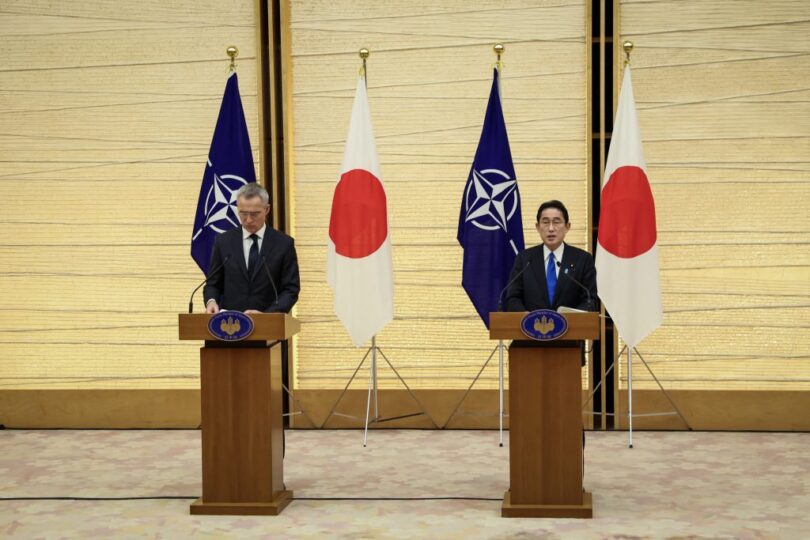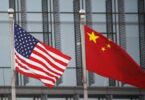Andrew Hammond
The news agenda this week has been dominated by talk about the US debt ceiling, a potential new offensive by Russia in Ukraine, and a new EU green growth plan.
Yet, taking place largely under the global radar, there was also a potentially hugely significant visit by NATO Secretary General Jens Stoltenberg to Japan and South Korea.
Important as the South Korean leg of his trip was, the visit to Japan was particularly noteworthy. Stoltenberg said this week that Japan’s renewed focus on security means the nation is “even more” of a partner “for peace,” and he applauded its plans to double spending on defense, saying that this reflected the country’s resolve for greater security involvement in a volatile world.
Japan has long had very close military ties with the US. However, what is particularly significant, potentially, is the way in which Tokyo’s ties with Europe are blossoming on the security front.
Last month, the visits by Japanese Prime Minister Fumio Kishida to France, Italy and the UK highlighted the importance of security relations in the aftermath of the war in Ukraine. Whereas some politicians in Europe and Japan might previously have regarded a bilateral alliance as nonessential, it is now increasingly viewed as indispensable.
The growing bond between Russia and China worries both Japan and Europe. Meanwhile, the 2017-21 Trump presidency showed that the US might not always be the highly dependable ally it once was, especially given the possibility that Donald Trump might stand in next year’s presidential election, and perhaps win.
Moreover, while Tokyo and the European capitals have previously tended to view their relationships as being centered around economics, including the 2019 Japan-EU Comprehensive Economic Partnership Agreement, this is changing. The partnership is increasingly viewed in a broader strategic context, as last month’s discussions around security issues have shown.
During Kishida’s visit, Japan and the UK signed a new “reciprocal access” treaty that allows military forces from both nations to be deployed on each other’s soil. It has been described as the most important military agreement between the two powers since 1902.
In France, the key issues Kishida discussed with President Emmanuel Macron included the war in Ukraine, and the strengthening of French and Japanese security ties in the Indo-Pacific region, which Paris intends to make a priority axis of its diplomacy.
France, which is already active in Japan’s civil nuclear industry, intends to strengthen its presence in the nation’s military industry; Tokyo recently announced plans to significantly increase the budget for its armed forces.
Meanwhile, Italian Prime Minister Giorgia Meloni announced that her country is looking to develop a new “strategic partnership” with Japan. On the security front, Italy recently joined forces with the UK and Japan to collaborate on the development of a new fighter jet that uses artificial intelligence.
While Kishida did not visit Germany — the remaining European member of the G7 — last month, there is no question that Chancellor Olaf Scholz is pro-Japan, too. He recently acknowledged that his choice of Japan as the destination for his first official visit to Asia since becoming chancellor was “no coincidence,” given the close ties between Berlin and Tokyo.
While security issues are increasingly key to relations between Europe and Japan, economic and industrial issues remain very important as well. With Europe and Japan concerned by the US Inflation Reduction Act, they are stepping up collaboration in a number of areas, including energy-related security and cooperation.
An agreement between the EU and Japan in December for cooperation on hydrogen underlines the strength of the two powers in this sector, which was clearly shown in a joint study published last month by the European Patent Office and International Energy Agency. It assessed the patents filed for all technologies relating to hydrogen between 2011 and 2020, and found Europe and Japan to be head of the global pack.
The key reason for Stoltenberg’s trip this week, and for Kishida’s last month, is that Japan holds the presidency of the G7 for 2023, which Europe believes will be one of the most important years for the group in the post-Cold War era, given the continuing war in Ukraine.
As was the case during the Cold War, when the G7 coordinated the West’s economic and security responses to the Soviet Union, the G7 is likely to assume increasing importance among the Western allies as they put less emphasis on the G20, given Russia and China’s membership of that larger group.
There are some who are skeptical about the chances of the G7 producing any meaningful outcomes this year. However, the Western club has previously been at its best in times of crisis. The very fact that it was founded in 1975 in the aftermath of the geopolitical and economic shocks that followed the decision of the US to withdraw from the Gold Standard underlines the fact that it can potentially be fit for purpose in turbulent times, such as today.
In the mid-1970s, the G7 played a key role in managing the key issues of the day and also formally brought Japan into the Western policy-making community. A similar far-sighted, strategic approach is needed in 2023.







